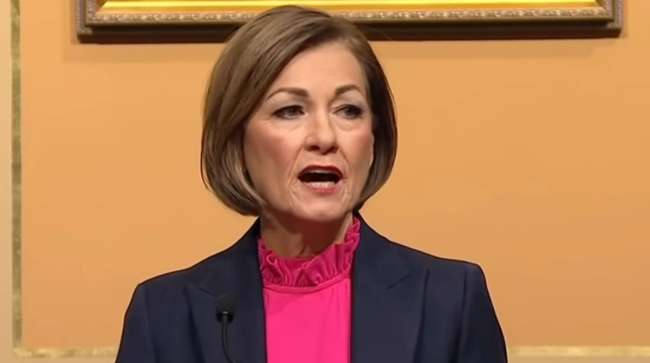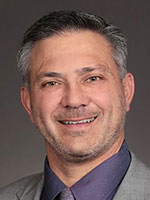Senior Reporter
Iowa Truckers Pursue Lawsuit Abuse Legislation

[Stay on top of transportation news: Get TTNews in your inbox.]
Iowa Republican Gov. Kim Reynolds and a trucker turned state senator are waging a two-pronged legislative offensive targeting lawsuit abuse in traffic accidents with motor carriers.
One bill, supported by Reynolds and the Iowa Motor Truck Association, would limit litigation awards to $1 million in civil lawsuits involving commercial motor vehicle accidents.
The other bill, introduced by Republican state senator Adrian Dickey, owner of Packwood, Iowa-based Dickey Transport, would end the controversial practice of financial firms funding litigation for attorneys who sue trucking companies. If the funding litigation ban is enacted into law, Iowa would be the first state to prohibit the practice.

Dickey
Litigation funding, which has been putting truckers’ defense attorneys at a disadvantage, is on the rise nationwide, experts said.
The tactic involves providing loans — predominantly to plaintiff attorneys — or, in some instances, directly paying doctors up front for treatment of individuals injured in accidents, according to insurance experts and defense attorneys who monitor litigation finance. The funding companies are repaid by sharing a designated portion of a settlement or win by a plaintiff’s attorney. If there is no settlement or jury award, a plaintiff attorney is not required to repay the loan.
“In my state, few people outside of our industry are aware of this,” Dickey said. “We’re taking a lead on this, and we’re probably the first state to push it.”
Dickey’s litigation funding bill, SF 2085, was introduced in the state Senate on Jan. 20 but had not advanced as of press time. At a Feb. 9 subcommittee meeting, some members said that before it clears committee the bill needs an amendment to more clearly define litigation funding.
Iowa SF 2085 by Transport Topics on Scribd
Dickey also is a board member of the Iowa Motor Truck Association.
The Iowa bill would not block plaintiff attorneys from taking traffic accident litigation on a contingency basis, a generally accepted common practice in civil litigation cases. Those cases usually do not require upfront costs to injured parties, but allow plaintiff attorneys to keep one-third or more of a settlement or jury award.
In a 2018 study, the Congressional Research Service noted that opponents of litigation funding have said the money “undesirably increases the volume and length of litigation by litigants even where doing so would otherwise not be economically rational.”
The report added that, according to critics, the prolonged litigation engendered by litigation funding actually hurts defendant motor carriers, who are forced to divert additional time and money from productive activity to defending litigation.
In her Jan. 11 Condition of the State speech, Reynolds said, “When accidents and mistakes happen, injured Iowans deserve to be fairly compensated. Like many states have already done, we need to put reasonable caps on noneconomic damages for trucking accidents and medical malpractice.”
The governor’s tort reform bill would limit the total amount of recoverable “noneconomic” damages against the owner or operator of a commercial motor vehicle to $1 million, “regardless of the number of derivative claims, theories of liability or defendants in the civil action.”
Brenda Neville, president of the Iowa Motor Truck Association, said her group is focusing its support on the tort reform bill, but not the financial lending bill.
Iowa Tort Reform Bill by Transport Topics on Scribd
“The tort reform bill is a full-court press. It’s an important bill and will move the needle, but it’s a lot of work,” Neville told Transport Topics. “We have great support in the Senate. In the House we have 49 votes, but we need 51. Just getting two votes is a lot of work, but we remain cautiously optimistic.”
The tort reform bill is a full-court press. It’s an important bill and will move the needle, but it’s a lot of work.
Iowa Motor Truck Association President Brenda Neville
The legislative session in scheduled to end in mid-April.
The future of the Iowa litigation funding bill remains uncertain.
“There’s no question it’s a very important issue, and it really is a substantial part of what is driving the lawsuit-abuse crisis in trucking,” said Rich Pianka, American Trucking Associations’ general counsel. “Even states where the litigation funding practices doesn’t seem like a problem, it’s just a problem waiting to happen.”
At the Feb. 9, subcommittee hearing, David Bauer, vice president for state and tax policy at ATA, told Iowa Senate subcommittee members that he had concerns about the motivations behind litigation funding.

Bauer
“I am not aware of any business that loans or lends money on the basis of charity,” Bauer said. “These are profit-making entities. They’re using a lawsuit as an investment opportunity.”
Bauer added, “You’re talking to somebody who represents an industry that has just been battered by what we consider abusive lawsuits. Based on what we hear from our members, we’re seeing in some states that a truck accident looks like a good investment opportunity. It troubles us to a degree.”
There were naysayers to Dickey’s bill, including Democratic Iowa state Sen. Herman Quirmbach. He argued litigation funding can help those who cannot compete with well-funded adversaries in court.

Quirmbach
“Litigation these days is expensive, it’s complex, and it’s often drawn out potentially for years,” Quirmbach said at the subcommittee hearing. “The ordinary citizen and small business isn’t going to have access to the level of capital that’s going to be able to sustain them through that kind of effort. The lack of capital may in fact deny them access to the courts.”
Pianka called Quirmbach’s argument “nonsense.”
“That’s really a pretty hollow justification,” Pianka said. “The bottom line is, it perverts the system. With any meritorious case, and plenty of nonmeritorious cases, you’ll be able to get a lawyer to take the case on contingency. No question about that.”

Pianka
He added, “Litigation financing is one of many factors that is contributing to the law abuse phenomenon that we’re dealing with. You take a process that is supposed to be about making wrongly injured people whole and you turn it into an investment opportunity when you have third-party financing involved.
“These third-party companies are coming in looking for a return on their investments. And now you’ve radically distorted the judicial process in making people whole.”
Pianka said ATA has supported the federal Highway Accident Fairness Act of 2021, introduced in congress in December by Reps. Garret Graves (R-La.) and Henry Cuellar (D-Texas).
Want more news? Listen to today's daily briefing above or go here for more info
While it would not ban litigation funding, the bipartisan bill would require a disclosure to all parties of the involvement of third-party litigation financing in highway accident cases.
It would allow defense attorneys, and even the injured party in a case, to know when a case was being funded by “a third party standing in the shadows.”
ATA’s Bauer said 12 states regulate the practice, mostly through disclosure laws.
The Highway Accident Fairness bill also would make it easier to get high-value highway cases into federal court, as opposed to state court, and it would make staged accidents a federal crime punishable by up to 20 years in prison.
Staged accidents have been numerous in the New Orleans area. However, because there is no federal law for staging accidents per se, federal prosecutors in Louisiana have had to charge scammers on federal mail fraud violations.





